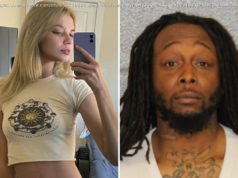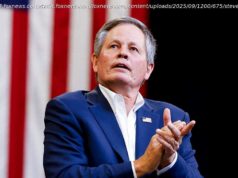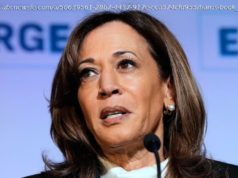« I think from a practical standpoint most people would’ve taken that meeting. It’s called opposition research, or even research into your opponent, » Trump said.
WASHINGTON — President Donald Trump on Thursday defended his son’s meeting with a Russian lawyer, characterizing it as standard campaign practice and maintaining that « nothing happened » as a result of the June sit-down.
The remarks in Paris during a joint news conference with French President Emmanuel Macron came even though Trump’s own FBI pick has said authorities should be advised of requests to meet with foreign individuals during a campaign and even after Donald Trump Jr. said he would rethink his own conduct in agreeing to the meeting in the first place.
« I think from a practical standpoint most people would’ve taken that meeting. It’s called opposition research, or even research into your opponent, » Trump said.
Trump Jr. released emails this week from 2016 in which he appeared eager to accept information from the Russian government that could have damaged Hillary Clinton’s campaign. The emails were sent ahead of a Trump Tower meeting with a Russian lawyer that Trump’s former campaign manager, Paul Manafort, and Trump’s son-in-law, Jared Kushner, also attended.
Asked about the meeting Thursday, Trump said « politics is not the nicest business in the world » and that it’s standard for candidates to welcome negative information about an opponent. In this case, he added, « nothing happened from the meeting, zero happened from the meeting. »
Trump’s comments stood in contrast to the position of his nominee for FBI director, Christopher Wray, who at his confirmation hearing Wednesday was asked what candidates should do if they’re told a foreign government wants to help by offering damaging information about an opponent.
« Any threat or effort to interfere with our elections from any nation-state or any non-state actor, » Wray said, « is the kind of thing the FBI would want to know. »
Trump Jr. himself said in a Fox News interview Tuesday night that « in retrospect I probably would have done things a little differently. »
Meanwhile, the Republican chairman of the Senate Judiciary Committee said he would call on Trump Jr. to testify as part of an investigation into Russian meddling in last year’s election and would subpoena him if necessary. Witnesses who refuse to comply with subpoenas risk being held in contempt.
Sen. Chuck Grassley, R-Iowa, said he wants Trump Jr. to testify « pretty soon, » and it could be as early as next week. He wouldn’t say what he wants to hear from Trump Jr., but said members aren’t restricted « from asking anything they want to ask. » The panel’s top Democrat, California Sen. Dianne Feinstein, had also called on Trump Jr. to testify.
A lawyer for Donald Trump Jr. did not immediately respond to a message seeking comment. A spokesman for the Senate Judiciary Committee said the letter hasn’t been sent.
The Judiciary Committee is one of several congressional panels investigating Russian meddling in the U. S. election, along with Special Counsel Robert Mueller. U. S. intelligence agencies have accused the Russian government of meddling through hacking in last year’s election to benefit Trump and harm Clinton, and authorities are exploring potential coordination between Moscow and the Trump campaign.
Virginia Sen. Mark Warner, the top Democrat on the Senate intelligence committee, has also said he’d like to hear from Trump Jr and said the panel has requested documents from him. But committee chairman, Republican Sen. Richard Burr of North Carolina, hasn’t said whether the secretive committee will call him in. Trump Jr. tweeted Monday that he was « happy to work with the committee to pass on what I know. »
It’s unclear whether Trump Jr. would be as eager to testify before the Judiciary panel, which generally conducts open hearings. The Senate intelligence committee interviews many of its witnesses behind closed doors, though it has held an unusual number of open hearings as part of the Russia probe.
The June 9 meeting involved a lawyer, Natalia Veselnitskaya, who was described to Trump Jr. in emails as a « Russian government lawyer » who had incriminating information on Clinton. Trump, apparently referencing an article in The Hill newspaper that said the Justice Department had enabled the attorney to be in the country, suggested Thursday « she was here » because of former Attorney General Loretta Lynch.
An assistant United States attorney in a January court hearing in New York said the federal government had bypassed the normal visa process and granted a « type of extraordinary permission » so that her client could be in the U. S. to be deposed in a Justice Department lawsuit involving a Russian investment firm. The government, the lawyer said, « made the further accommodation of allowing his Russian lawyer into the country to assist. »
In a statement, Lynch said she had no knowledge of Veselnitskaya’s travel. « The State Department issues visas, and the Department of Homeland Security oversees entry to the United States at airports, » the statement said.
Also Thursday, the Justice Department released a heavily redacted page from Attorney General Jeff Sessions’ security clearance application in response to a government watchdog group’s lawsuit.
The application page asks whether Sessions, a senator before joining the Trump administration, or anyone in his immediate family had contact within the past seven years with a foreign government or its representatives. There’s a « no » box checked. The rest of the answer is redacted.
The department had already acknowledged that Sessions omitted from his form meetings he had with foreign dignitaries, including the Russian ambassador. A department spokesman said Sessions had been told that routine encounters as part of Sessions’ Senate duties didn’t have to be included on the form.






![Drony nad Polską. Oto kiedy naruszały naszą przestrzeń powietrzną? [KALENDARIUM]](http://nhub.news/wp-content/uploads/2025/09/thumbb0c02e8630e5456d5896703b98be9600-100x75.jpeg)